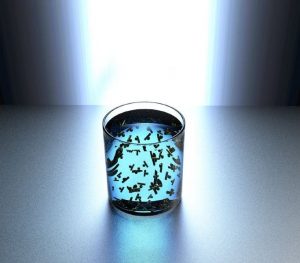Scarcity of clean water and poor access to sanitation are identified as global challenges, which are expected to grow worse in the near future. Sea water desalination is one of the currently discussed technologies that could solve this problem. One way of doing this is to generate water steam by harnessing solar energy.
Fratalocchi and co-workers from KAUST recently came up with nanoparticles which are super-dark and therefore very efficient at light-absorption. They loaded the particles on a spongy substrate which floated on water. This assembly provided a thin water film around the absorbing nanoparticles. By converting solar radiation into heat, the particles could provide energy with high thermal efficiency to transform water into clean water steam. This is very attractive for industrial and academic oriented applications, which range from large scale desalination power plants and sterilization systems to steam-driven nanorachets. On top of that the whole system is recyclable and can be produced on a large scale.

Find out more details in the free-to-read article in Advanced Sustainable Systems.

















